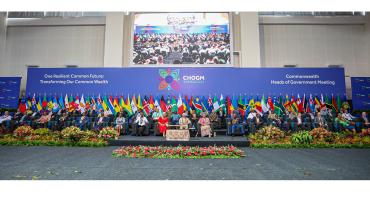The HIV/AIDS response in Commonwealth countries post-2015 will need to focus on people-centred development, equity and social inclusion, and collective action, delegates at a Commonwealth forum heard today, ahead of World AIDS Day on 1 December 2012. The forum took place at the Commonwealth Secretariat's headquarters at Marlborough House in London.
As the 2015 deadline for the Millennium Development Goals draws closer, the priorities going forward will also need to include smarter investments in the global HIV/AIDS response and extracting greater value from available resources. While total resources to tackle the epidemic continue to grow, they fall short of the total needs, the forum heard.
Commonwealth Deputy Secretary-General Mmasekgoa Masire-Mwamba highlighted the progress many Commonwealth countries have made in recent years in the areas of access to HIV/AIDS treatment, mother-to-child-transmission and stigma and discrimination. But she observed that there is still a long way to go for many others.
Mrs Masire-Mwamba said human rights are important to the HIV/AIDS response and she stressed that the Commonwealth continues to promote dialogue across the wide spectrum of views to ensure discrimination is not tolerated on any grounds, especially in relation to the gay community.
“Within our Human Rights Unit here at the Secretariat we have worked closely with the gay community and there is continued dialogue and engagement. In all our interventions we continue to reflect that what is important is cross-spectrum dialogue,” she said.
Speaking during the panel discussion, Michael Bartos, Interim Chief of the Science For Action Division of UNAIDS, said several Commonwealth countries have made significant progress in the reduction of HIV/AIDS incidence. Countries such as Botswana and Malawi have recorded 70 per cent reduction in rates of infection. However progress is less marked in other countries.
Mr Bartos said key challenges persist with available resources since many lower and middle income countries depend on donor assistance. But he explained that domestic spending is increasing and cited studies which show that by 2020, many low income countries with significant numbers of persons living with HIV/AIDS will move up to the middle income bracket.
“Countries are taking a hard look at how they are deploying their AIDS resources and there is also a focus on whether there is a clear return on investments. The Commonwealth as a global player is poised to shape the priorities post-2015 and going forward, it has to take up the three main areas identified in a major way,” Mr Bartos added.
The path to post-2015 will also need to focus on the vulnerabilities facing women and young girls, and addressing the concerns regarding their development, remarked Dr Charlotte Watts, STRIVE Research Director at the London School of Hygiene and Tropical Medicine. She said income, economic skills and opportunities for women and young girls are important to the HIV/AIDS response.
Travis Mitchell, Economic Adviser at the Commonwealth Secretariat, emphasised the need for innovative financing in HIV/AIDS, given the current environment of cuts in international aid budgets. He said that while there is still no clear consensus post-2015, there is a concern about what share of funding individual developing countries will be able to contribute, and what can be expected from donor agencies post-2015.
Mr Mitchell highlighted innovative financing programmes such as the Debt to Health initiative and Product Red by the Global Fund, which have raised significant resources for the HIV/AIDS response. He added that the debate continues about the Robin Hood tax, which if implemented, could see billions being raised for the HIV/AIDS response from a levy on global currency transactions.
Dr Scott Pulizzi, UNAIDS Inter-Agency Task Team on Education at UNESCO, also addressed the importance of building country capacity for effective and sustainable education responses to HIV. He noted that the post-2015 agenda must include a focus on strengthening comprehensive HIV/AIDS education and advancing gender equality, as well as protecting human rights.



